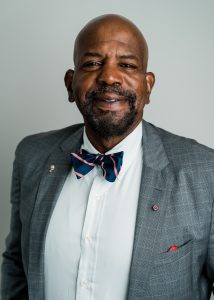
Welcome to The Cato T. Laurencin Institute for Regenerative Engineering. We believe that our work will offer solutions and hope for people who have ailments that, today, are beyond repair.
About The CEO – Dr. Cato T. Laurencin
Professor Sir Cato T. Laurencin, M.D., Ph.D., K.C.S.L., is the University Professor and Albert and Wilda Van Dusen Distinguished Endowed Professor of Orthopaedic Surgery at the University of Connecticut. He is Professor of Chemical and Biomolecular Engineering, Professor of Materials Science and Engineering and Professor of Biomedical Engineering at the school. He serves as the Chief Executive Officer of The Cato T. Laurencin Institute for Regenerative Engineering an Institute created and named in his honor.
Dr. Laurencin earned a B.S.E. in Chemical Engineering from Princeton University and his M.D., Magna Cum Laude, from the Harvard Medical School where he received the Robinson Award for Surgery. He earned his Ph.D. in Biochemical Engineering/Biotechnology from the Massachusetts Institute of Technology, where he was named a Hugh Hampton Young Fellow.
Dr. Laurencin is the founder and pioneer of the field of Regenerative Engineering. He is an expert in biomaterials science, stem cell technology, and nanotechnology and the American Institute of Chemical Engineers Foundation created the Cato T. Laurencin Founder’s Award in Regenerative Engineering in his honor. He received the Priestley Medal (highest award) from the American Chemical Society. He received the Founder’s Award (highest award) from the Society for Biomaterials, the Founder’s Award (highest award) from the American Institute of Chemical Engineers, the Von Hippel Award (highest award) from the Materials Research Society, and the James Bailey Award (highest award) from the Society for Biological Engineering. He received the NIH Director’s Pioneer Award, NIH’s highest and most prestigious research award, for his field of Regenerative Engineering and the National Science Foundation’s Emerging Frontiers in Research and Innovation Grant Award. Dr. Laurencin is the Editor-in-Chief of Regenerative Engineering and Translational Medicine, published by Springer Nature, and is the Founder of the Regenerative Engineering Society. He is a Fellow of the American Chemical Society, a Fellow of the American Institute of Chemical Engineers, a Fellow of the Biomedical Engineering Society, a Fellow of the Materials Research Society, and an AAAS Fellow. The American Association for the Advancement of Science awarded Dr. Laurencin the Philip Hauge Abelson Prize given ‘for signal contributions to the advancement of science in the United States’.
Dr. Laurencin is an elected member of the National Academy of Sciences, an elected member of the National Academy of Engineering, an elected member of the National Academy of Medicine, and an elected fellow of the National Academy of Inventors. He is the first surgeon in the world to be elected to all four of these academies. He is an elected fellow of the American Academy of Arts and Sciences and an elected fellow of the American Association for the Advancement of Science. Active internationally, he is an elected fellow of the Indian National Academy of Sciences, the Indian National Academy of Engineering, the National Academy of Sciences, India, the African Academy of Sciences, the Senegalese Academy of Arts and Sciences, the Benin Academy of Sciences, the European Academy of Sciences, the Academia Europaea, the Royal Academy of Engineering, The World Academy of Sciences, and he is an Academician of the Chinese Academy of Engineering.
Dr. Laurencin is the recipient of the National Medal of Technology and Innovation, America’s highest honor for technological achievement, awarded by President Barack Obama in ceremonies at the White House. He is the first individual in history to receive one of the oldest/highest awards of the National Academy of Medicine (the Walsh McDermott Medal) and the oldest/highest award of the National Academy of Engineering (the Simon Ramo Founder’s Award). He will receive the Dickson Prize in Medicine this year. Many of the Dickson Prize awardees have gone on to receive the Nobel Prize.
Sir Cato T. Laurencin was bestowed Knight Commander of the Order of St. Lucia, under the auspices of King Charles III of England by the General Governor of Lucia for his exceptional and outstanding service of national importance to Saint Lucia.
About The Cato. T. Laurencin Institute for Regenerative Engineering
Regenerative engineering is a field founded by Professor Cato T. Laurencin. It is described as the convergence of advanced materials sciences, stems cell science, physics, developmental biology, and clinical translation for the regeneration of complex tissues and organ systems. The Cato T. Laurencin Institute for Regenerative Engineering represents a transdisciplinary effort at UConn with a focus on the musculoskeletal area. The Institute integrates medicine, engineering, surgery, biology, physics, chemistry, and statistics/machine learning to enable a powerful platform for addressing scientific and medical problems in the regeneration and healing of complex tissues, organs, or organ systems.
Our Foundational Principles
- Innovation: The Cato T. Laurencin Institute for Regenerative Engineering believes that regenerative engineering offers solutions and hope for people who have ailments that today are beyond repair.
- Education: The Cato T. Laurencin Institute for Regenerative Engineering is committed to promoting the professional development of UConn faculty and students, embracing the diversity of human talent in our communities.
- Collaboration: The Cato T. Laurencin Institute for Regenerative Engineering is committed to collaboration, serving as a bridge across the wide range of disciplines dedicated to regenerative engineering research.
- Community: The Cato T. Laurencin Institute for Regenerative Engineering believes that interactive community engagement is fundamental to the fulfillment of its societal commitment to the resilience of human function.
Areas of Focus
The grand challenge to regenerate complex tissue and organ systems calls for a paradigm shift that requires a transdisciplinary approach. The field of regenerative engineering uses a convergence approach to create a regenerative toolbox to move beyond individual tissue repair to the regeneration of complex tissues and organ systems. The Cato T. Laurencin Institute for Regenerative Engineering has defined regenerative engineering as a new field that convergences advanced materials sciences, stem cell sciences, physics, developmental biology, and clinical translation to foster scientific innovation. Embedded in this new field include the following five areas:
- Advanced Materials Sciences: The field of materials science has significantly advanced from the level of biodegradable polymers and ceramics to custom designed biomimetic inductive biomaterials with carefully modulated physical, mechanical, and biological properties to enhance the natural regenerative process of the body.
- Stem Cell Sciences: The progress in the field of stem cells research represents great scope in regenerative engineering.
- Physics: Physical forces play a subtle but crucial part bio-fitness and resilience.
- Developmental Biology: Principles found in embryological development and in developmental morphogenesis will ultimately be critical for addressing grand challenges in regeneration.
- Clinical Translation: The growing evidence of achieving better functional outcomes in larger animals using a biomaterial approach compared to smaller animals mirrors the translational potential of inductive biomaterials.
The Six Pillars
The new Cato T. Laurencin Institute for Regenerative Engineering embraces the six pillars described by Laurencin:
- Overwhelming Excellence in Science
- Anti-Racism and Justice
- Sponsorship and Mentorship
- International, National, and Community Action
- Transformative Technologies for Humanity
- Entrepreneurship and Economic Value Creation
This Institute supports a core mission of UConn to foster new ways of thinking and new approaches to finding answers in medicine, science, engineering, and technology. The Institute reports to the Office of the Provost.
Help Make A Difference
Scan the QR code to become part of our D.N.A.: Donate. Network. Advocate.
The UConn Foundation works in service of The University of Connecticut by stewarding, growing, and disbursing endowed funds for student scholarships, and academic and medical missions. The UConn Foundation’s sole purpose is to support UConn and UConn Health to advance their educational, scientific, cultural and research missions.
All donations are collected by UConn Foundation and go toward supporting our Institute through initiatives of the program which will include, but not limited to, general research, operations, and projects.
Orthopaedic Research and Education Foundation (OREF)
OREF is a charitable 501(c)(3) organization committed to improving patients’ lives by funding musculoskeletal research that advances clinical practice. OREF is pleased to partner with the University of Connecticut (UConn) Foundation to support The Cato T. Laurencin Institute for Regenerative Engineering.
Make a donation through OREF to The Cato T. Laurencin Institute for Regenerative Engineering.

